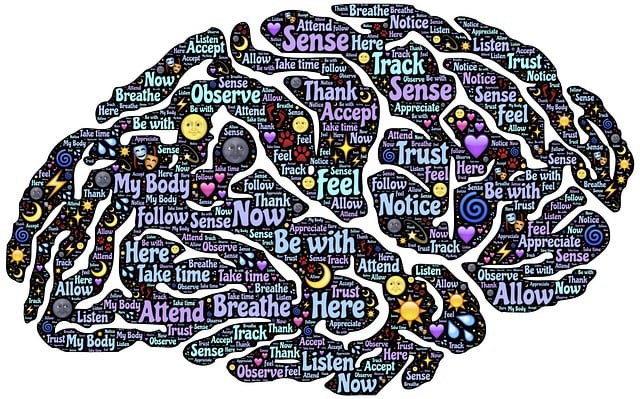Broomfield Relationship Issues Therapy (BRIT) offers a unique approach to Mental Health Education by addressing the link between interpersonal relationships and emotional well-being. Through interactive workshops, BRIT equips individuals with skills for emotional regulation, stress management, and navigating complex dynamics. This strategy breaks down mental health stigma, creates supportive communities, and ensures learning translates into real-life strategies. Key areas are identified through community engagement and data collection, leading to tailored programs that resonate with local needs. Incorporating diverse learning strategies, BRIT fosters empathy, emotional regulation, and healthy relationships, empowering individuals to lead balanced lives. Accessible venues, flexible sessions, online platforms, and a robust support system enhance inclusivity. Evaluating program impact through surveys, feedback, and data integration ensures continuous improvement and relevance.
Mental health education programs play a pivotal role in fostering well-being within communities. This article explores the design of an effective program, leveraging Broomfield Relationship Issues Therapy as a foundational model. We delve into identifying community needs through comprehensive assessments, crafting engaging curricula, and ensuring accessibility during implementation. Key strategies for evaluation and measuring impact are also presented, highlighting how these steps shape successful and sustainable mental health education initiatives.
- Understanding Broomfield Relationship Issues Therapy: A Foundation for Mental Health Education
- Identifying Key Areas: Assessing Community Needs and Challenges
- Crafting an Engaging Curriculum: Strategies for Effective Learning
- Implementation and Logistics: Ensuring Accessibility and Support
- Evaluation and Impact: Measuring Success and Shaping Future Programs
Understanding Broomfield Relationship Issues Therapy: A Foundation for Mental Health Education

Broomfield Relationship Issues Therapy (BRIT) serves as a robust foundation for mental health education programs. This therapeutic approach focuses on addressing interpersonal relationships and their profound impact on individual emotional well-being, which is a key aspect often overlooked in traditional mental wellness initiatives. BRIT emphasizes that many mental health challenges stem from or are exacerbated by relationship issues, making it a crucial component of any comprehensive mental health education strategy.
Incorporating BRIT into educational settings facilitates the development of essential skills for emotional regulation and stress management. Through interactive workshops and group discussions, participants learn to identify and navigate complex dynamics within relationships, fostering healthier interactions. This approach not only empowers individuals with effective coping mechanisms but also encourages a supportive community where open dialogue about mental health is encouraged, breaking down stigma associated with seeking assistance. Moreover, BRIT’s practical application in real-life scenarios ensures that learning translates into actionable strategies for managing and improving mental wellness within the organization.
Identifying Key Areas: Assessing Community Needs and Challenges

Identifying Key Areas is a crucial step in designing an effective Mental Health Education program. Community needs and challenges should be assessed to understand the specific mental health issues prevalent among its residents. This process involves gathering data through surveys, focus groups, or community meetings to identify pressing concerns like high stress levels, relationship issues, or stigma surrounding mental illness. Broomfield Relationship Issues Therapy, for instance, can highlight the importance of addressing interpersonal challenges as a significant aspect of overall mental well-being. By understanding these needs, program designers can tailor educational content and interventions that resonate with the community’s unique challenges.
Mind Over Matter principles can be incorporated to empower individuals with coping strategies and resilience-building techniques. Additionally, Mental Illness Stigma Reduction Efforts should be integrated into the program to foster an environment of acceptance and support. Effective Communication Strategies are also essential tools for breaking down barriers and encouraging open discussions about mental health, ensuring that the education program is inclusive and accessible to all community members.
Crafting an Engaging Curriculum: Strategies for Effective Learning

Crafting an engaging curriculum is paramount when designing a mental health education program. Effective learning experiences should incorporate interactive and diverse strategies to cater to different learning styles. One powerful approach is to integrate Broomfield Relationship Issues Therapy techniques, which not only foster empathy building strategies but also enhance emotional regulation skills. By creating scenarios that simulate real-life challenges, participants can practice active listening, perspective-taking, and nonviolent communication – essential tools for managing both personal and professional relationships.
Additionally, incorporating confidence boosting activities alongside lessons on emotional regulation can significantly impact program effectiveness. Encouraging self-reflection through journaling or group discussions helps individuals identify their emotional triggers and develop coping mechanisms. Through these exercises, participants gain a deeper understanding of their emotions and learn to manage them in a healthy way. This holistic approach ensures that the curriculum not only captivates but also empowers individuals to lead more balanced and fulfilling lives.
Implementation and Logistics: Ensuring Accessibility and Support

Implementing a mental health education program requires careful planning to ensure accessibility and support for all participants. The logistics involved in organizing such initiatives are crucial, especially when addressing Broomfield Relationship Issues Therapy. This includes selecting suitable venues that cater to diverse needs, considering physical access, and offering sessions at various times to accommodate different schedules. For instance, incorporating online or virtual platforms can significantly enhance reach and inclusivity, enabling individuals with mobility challenges or those in remote areas to engage.
A comprehensive support system is integral to the program’s success. This encompasses providing resources for stress reduction methods and burnout prevention strategies, ensuring participants have access to relevant literature, and offering one-on-one counseling sessions for those who require additional help. By fostering an environment of understanding and open communication, these measures can contribute to improved mental wellness among the community.
Evaluation and Impact: Measuring Success and Shaping Future Programs

Evaluating the impact of a mental health education program is paramount to understanding its success and identifying areas for improvement. This process involves assessing the knowledge gain, attitude shifts, and behavioral changes among participants. Well-designed assessment tools can capture the program’s effectiveness in alleviating anxiety relief, managing stress, and fostering cultural sensitivity in mental healthcare practice. By examining pre- and post-program surveys, facilitators can gauge the depth of learning and personal growth.
The feedback mechanism also plays a crucial role in shaping future programs. Qualitative data from participant experiences offers valuable insights into what worked well and what could be enhanced. This information, coupled with quantitative metrics, enables continuous improvement in mental health education, ensuring that programs like Broomfield Relationship Issues Therapy remain effective and relevant. Moreover, incorporating risk management planning for mental health professionals is essential to maintaining a safe and supportive learning environment.
Broomfield Relationship Issues Therapy serves as a robust foundation for comprehensive mental health education programs. By identifying key community needs and challenges through assessing local dynamics, educators can design engaging curricula that foster effective learning experiences. Implementing these programs with careful consideration of accessibility and support ensures their impact is maximized. Continuous evaluation allows for measuring success and making data-driven adjustments, ultimately shaping future initiatives to better serve the mental health landscape. Incorporating strategies from Broomfield Relationship Issues Therapy ensures programs are equipped to address diverse needs and foster positive change in communities.













